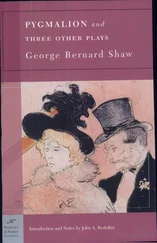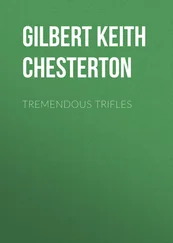Gilbert Chesterton - George Bernard Shaw
Здесь есть возможность читать онлайн «Gilbert Chesterton - George Bernard Shaw» — ознакомительный отрывок электронной книги совершенно бесплатно, а после прочтения отрывка купить полную версию. В некоторых случаях можно слушать аудио, скачать через торрент в формате fb2 и присутствует краткое содержание. Жанр: foreign_antique, foreign_prose, на английском языке. Описание произведения, (предисловие) а так же отзывы посетителей доступны на портале библиотеки ЛибКат.
- Название:George Bernard Shaw
- Автор:
- Жанр:
- Год:неизвестен
- ISBN:нет данных
- Рейтинг книги:5 / 5. Голосов: 1
-
Избранное:Добавить в избранное
- Отзывы:
-
Ваша оценка:
- 100
- 1
- 2
- 3
- 4
- 5
George Bernard Shaw: краткое содержание, описание и аннотация
Предлагаем к чтению аннотацию, описание, краткое содержание или предисловие (зависит от того, что написал сам автор книги «George Bernard Shaw»). Если вы не нашли необходимую информацию о книге — напишите в комментариях, мы постараемся отыскать её.
George Bernard Shaw — читать онлайн ознакомительный отрывок
Ниже представлен текст книги, разбитый по страницам. Система сохранения места последней прочитанной страницы, позволяет с удобством читать онлайн бесплатно книгу «George Bernard Shaw», без необходимости каждый раз заново искать на чём Вы остановились. Поставьте закладку, и сможете в любой момент перейти на страницу, на которой закончили чтение.
Интервал:
Закладка:
I should roughly define the first spirit in Puritanism thus. It was a refusal to contemplate God or goodness with anything lighter or milder than the most fierce concentration of the intellect. A Puritan meant originally a man whose mind had no holidays. To use his own favourite phrase, he would let no living thing come between him and his God; an attitude which involved eternal torture for him and a cruel contempt for all the living things. It was better to worship in a barn than in a cathedral for the specific and specified reason that the cathedral was beautiful. Physical beauty was a false and sensual symbol coming in between the intellect and the object of its intellectual worship. The human brain ought to be at every instant a consuming fire which burns through all conventional images until they were as transparent as glass.
This is the essential Puritan idea, that God can only be praised by direct contemplation of Him. You must praise God only with your brain; it is wicked to praise Him with your passions or your physical habits or your gesture or instinct of beauty. Therefore it is wicked to worship by singing or dancing or drinking sacramental wines or building beautiful churches or saying prayers when you are half asleep. We must not worship by dancing, drinking, building or singing; we can only worship by thinking. Our heads can praise God, but never our hands and feet. That is the true and original impulse of the Puritans. There is a great deal to be said for it, and a great deal was said for it in Great Britain steadily for two hundred years. It has gradually decayed in England and Scotland, not because of the advance of modern thought (which means nothing), but because of the slow revival of the mediæval energy and character in the two peoples. The English were always hearty and humane, and they have made up their minds to be hearty and humane in spite of the Puritans. The result is that Dickens and W. W. Jacobs have picked up the tradition of Chaucer and Robin Hood. The Scotch were always romantic, and they have made up their minds to be romantic in spite of the Puritans. The result is that Scott and Stevenson have picked up the tradition of Bruce, Blind Harry and the vagabond Scottish kings. England has become English again; Scotland has become Scottish again, in spite of the splendid incubus, the noble nightmare of Calvin. There is only one place in the British Islands where one may naturally expect to find still surviving in its fulness the fierce detachment of the true Puritan. That place is the Protestant part of Ireland. The Orange Calvinists can be disturbed by no national resurrection, for they have no nation. In them, if in any people, will be found the rectangular consistency of the Calvinist. The Irish Protestant rioters are at least immeasurably finer fellows than any of their brethren in England. They have the two enormous superiorities: first, that the Irish Protestant rioters really believe in Protestant theology; and second, that the Irish Protestant rioters do really riot. Among these people, if anywhere, should be found the cult of theological clarity combined with barbarous external simplicity. Among these people Bernard Shaw was born.
There is at least one outstanding fact about the man we are studying; Bernard Shaw is never frivolous. He never gives his opinions a holiday; he is never irresponsible even for an instant. He has no nonsensical second self which he can get into as one gets into a dressing-gown; that ridiculous disguise which is yet more real than the real person. That collapse and humorous confession of futility was much of the force in Charles Lamb and in Stevenson. There is nothing of this in Shaw; his wit is never a weakness; therefore it is never a sense of humour. For wit is always connected with the idea that truth is close and clear. Humour, on the other hand, is always connected with the idea that truth is tricky and mystical and easily mistaken. What Charles Lamb said of the Scotchman is far truer of this type of Puritan Irishman; he does not see things suddenly in a new light; all his brilliancy is a blindingly rapid calculation and deduction. Bernard Shaw never said an indefensible thing; that is, he never said a thing that he was not prepared brilliantly to defend. He never breaks out into that cry beyond reason and conviction, that cry of Lamb when he cried, "We would indict our dreams!" or of Stevenson, "Shall we never shed blood?" In short he is not a humorist, but a great wit, almost as great as Voltaire. Humour is akin to agnosticism, which is only the negative side of mysticism. But pure wit is akin to Puritanism; to the perfect and painful consciousness of the final fact in the universe. Very briefly, the man who sees the consistency in things is a wit – and a Calvinist. The man who sees the inconsistency in things is a humorist – and a Catholic. However this may be, Bernard Shaw exhibits all that is purest in the Puritan; the desire to see truth face to face even if it slay us, the high impatience with irrelevant sentiment or obstructive symbol; the constant effort to keep the soul at its highest pressure and speed. His instincts upon all social customs and questions are Puritan. His favourite author is Bunyan.
But along with what was inspiring and direct in Puritanism Bernard Shaw has inherited also some of the things that were cumbersome and traditional. If ever Shaw exhibits a prejudice it is always a Puritan prejudice. For Puritanism has not been able to sustain through three centuries that native ecstacy of the direct contemplation of truth; indeed it was the whole mistake of Puritanism to imagine for a moment that it could. One cannot be serious for three hundred years. In institutions built so as to endure for ages you must have relaxation, symbolic relativity and healthy routine. In eternal temples you must have frivolity. You must "be at ease in Zion" unless you are only paying it a flying visit.
By the middle of the nineteenth century this old austerity and actuality in the Puritan vision had fallen away into two principal lower forms. The first is a sort of idealistic garrulity upon which Bernard Shaw has made fierce and on the whole fruitful war. Perpetual talk about righteousness and unselfishness, about things that should elevate and things which cannot but degrade, about social purity and true Christian manhood, all poured out with fatal fluency and with very little reference to the real facts of anybody's soul or salary – into this weak and lukewarm torrent has melted down much of that mountainous ice which sparkled in the seventeenth century, bleak indeed, but blazing. The hardest thing of the seventeenth century bids fair to be the softest thing of the twentieth.
Of all this sentimental and deliquescent Puritanism Bernard Shaw has always been the antagonist; and the only respect in which it has soiled him was that he believed for only too long that such sloppy idealism was the whole idealism of Christendom and so used "idealist" itself as a term of reproach. But there were other and negative effects of Puritanism which he did not escape so completely. I cannot think that he has wholly escaped that element in Puritanism which may fairly bear the title of the taboo. For it is a singular fact that although extreme Protestantism is dying in elaborate and over-refined civilisation, yet it is the barbaric patches of it that live longest and die last. Of the creed of John Knox the modern Protestant has abandoned the civilised part and retained only the savage part. He has given up that great and systematic philosophy of Calvinism which had much in common with modern science and strongly resembles ordinary and recurrent determinism. But he has retained the accidental veto upon cards or comic plays, which Knox only valued as mere proof of his people's concentration on their theology. All the awful but sublime affirmations of Puritan theology are gone. Only savage negations remain; such as that by which in Scotland on every seventh day the creed of fear lays his finger on all hearts and makes an evil silence in the streets.
Читать дальшеИнтервал:
Закладка:
Похожие книги на «George Bernard Shaw»
Представляем Вашему вниманию похожие книги на «George Bernard Shaw» списком для выбора. Мы отобрали схожую по названию и смыслу литературу в надежде предоставить читателям больше вариантов отыскать новые, интересные, ещё непрочитанные произведения.
Обсуждение, отзывы о книге «George Bernard Shaw» и просто собственные мнения читателей. Оставьте ваши комментарии, напишите, что Вы думаете о произведении, его смысле или главных героях. Укажите что конкретно понравилось, а что нет, и почему Вы так считаете.










